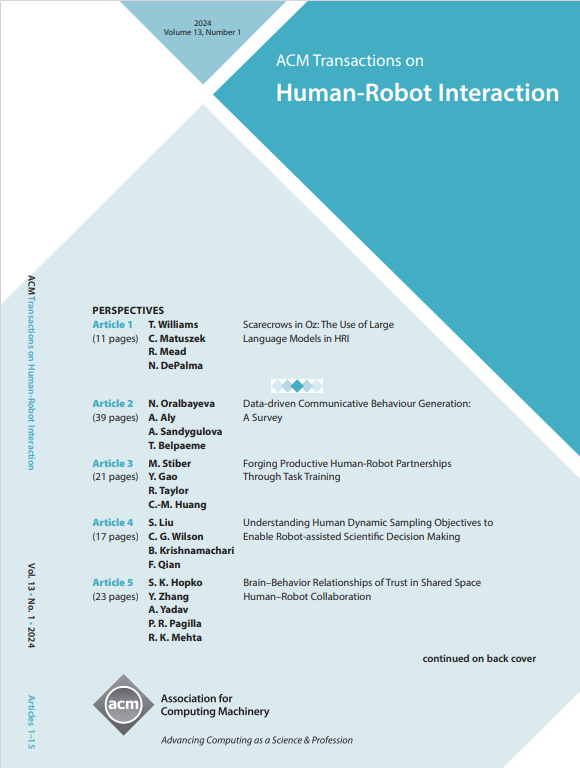The Answer lies in User Experience: Qualitative Comparison of US and South Korean Perceptions of In-home Robotic Pet Interactions
IF 5.5
Q2 ROBOTICS
引用次数: 1
Abstract
This paper describes a user experience comparison study to explore whether a user's 'cultural background' affects their interaction with in-home pet robots designed for health purposes, e.g. socially-assistive robots (SARs). 11 Koreans and 10 Americans were interviewed after interacting in their own homes with a SAR. Statistical analyses and TF-IDF keyword analyses were conducted to detect significant differences between groups in terms of code co-occurrences. Results showed that American participants were more likely to focus on the interactive experience itself, whereas Korean participants focused more on critiquing technical aspects of the technology. Such differences suggest that Koreans tend to treat robotic pets as "tools", while Americans view the robotic pet through the lens of their past experience raising real-life pets. We discuss implications of this for human-robot interaction (HRI) regarding SARs may be dependent on users' cultural characteristics, e.g. necessitating customized content that takes into account culturally-specific modes of use.答案在于用户体验:美国和韩国对家庭机器人宠物互动的看法的定性比较
本文描述了一项用户体验比较研究,以探索用户的“文化背景”是否会影响他们与为健康目的设计的家庭宠物机器人的互动,例如社交辅助机器人(SARs)。11名韩国人和10名美国人在自己家中与SAR互动后接受了采访。进行了统计分析和TF-IDF关键字分析,以发现两组之间在代码共现方面的显著差异。结果显示,美国参与者更关注互动体验本身,而韩国参与者更关注技术方面的批评。这种差异表明,韩国人倾向于将机器人宠物视为“工具”,而美国人则是通过他们过去饲养真实宠物的经验来看待机器人宠物。我们讨论了这对人机交互(HRI)的影响,因为sar可能依赖于用户的文化特征,例如,需要考虑到文化特定使用模式的定制内容。
本文章由计算机程序翻译,如有差异,请以英文原文为准。
求助全文
约1分钟内获得全文
求助全文
来源期刊

ACM Transactions on Human-Robot Interaction
Computer Science-Artificial Intelligence
CiteScore
7.70
自引率
5.90%
发文量
65
期刊介绍:
ACM Transactions on Human-Robot Interaction (THRI) is a prestigious Gold Open Access journal that aspires to lead the field of human-robot interaction as a top-tier, peer-reviewed, interdisciplinary publication. The journal prioritizes articles that significantly contribute to the current state of the art, enhance overall knowledge, have a broad appeal, and are accessible to a diverse audience. Submissions are expected to meet a high scholarly standard, and authors are encouraged to ensure their research is well-presented, advancing the understanding of human-robot interaction, adding cutting-edge or general insights to the field, or challenging current perspectives in this research domain.
THRI warmly invites well-crafted paper submissions from a variety of disciplines, encompassing robotics, computer science, engineering, design, and the behavioral and social sciences. The scholarly articles published in THRI may cover a range of topics such as the nature of human interactions with robots and robotic technologies, methods to enhance or enable novel forms of interaction, and the societal or organizational impacts of these interactions. The editorial team is also keen on receiving proposals for special issues that focus on specific technical challenges or that apply human-robot interaction research to further areas like social computing, consumer behavior, health, and education.
 求助内容:
求助内容: 应助结果提醒方式:
应助结果提醒方式:


